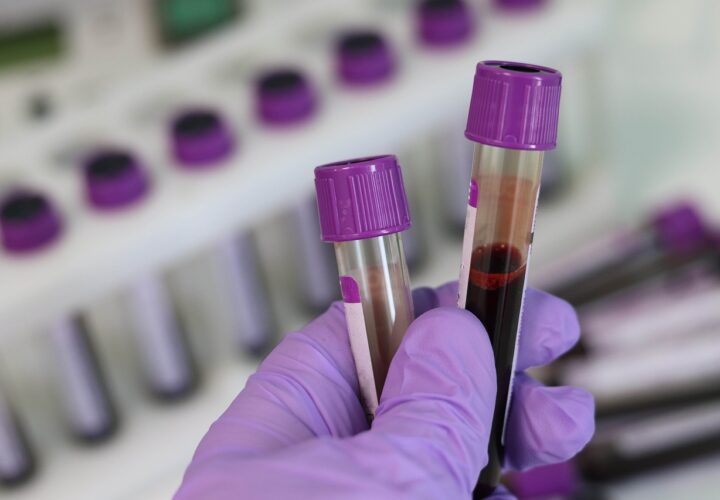Experimental diagnostic methods, like blood tests, might be less effective at diagnosing Alzheimer's in non-white ethnicities — because they were pretty much only tested in white people.
About 14 of every 100 of Black Americans older than 65 have Alzheimer’s disease, compared 10 in 100 white Americans of the same age — a 40-percent higher rate of Alzheimer’s. And this disparity is probably being dramatically underreported, as research shows Black patients also face discrimination accessing healthcare and receiving it. When Black patients do get the same access to quality cognitive healthcare and diagnostic processes as their white peers, there’s yet another barrier ahead: Historically rooted racial discrimination affects the way intelligence and cognitive function is measured.
Cutting-edge new Alzheimer’s diagnostics are still being tested in majority-white trials
Most medical research is conducted in white people, a sample that isn’t representative of diversity within the population. When researchers study diseases — and test their potential treatments — in only a tiny sliver of the population, it means they only get a tiny sliver of the full view. That’s why, moving forward, a major goal for Alzheimer’s advocates is to boost diversity in clinical trials, through methods like community advocacy and trial diversity quotas.
The need for improving diversity in clinical trials is urgent. Researchers also need to take a closer look at the design of the tests used to diagnose Alzheimer’s and other neurological diseases. Cognitive tests are already under scrutiny for their racist roots. Case in point: An April 2022 study published in Neurology found that three of four Alzheimer’s blood diagnostic tests are also inaccurate at diagnosing Alzheimer’s in African Americans.
“When you use a limited study population — as, unfortunately, scientists have traditionally done in Alzheimer’s research — and then try to apply the results to everyone, including people of diverse backgrounds, you could exacerbate health inequities,” Dr. Suzanne Schindler, an associate professor of neurology at Washington University and an author on the study, said in a news release at the time.
Some go-to Alzheimer’s blood biomarkers aren’t relevant in Black Americans
The 2022 research compared the performance of four different blood tests on 152 participants who were either non-hispanic white or who identified as African American. The participants were grouped into 76 matched pairs — people in the pair would have a similar age, ApoE4 status and cognitive ability — so that the largest difference within any pair would be their race.
Blood diagnostic tests are purported to work by finding proteins in the blood that strongly associate with either amyloid levels in the cerebrospinal fluid or in a PET scan. This can help someone understand their risk of developing the disease, helping them get screened earlier.
“The fact these risk models have not been tested in a lot of populations makes me wary, because Alzheimer’s is a global disease,” Dr. Thomas K. Karikari, a co-author on the study and an assistant professor in the University of Gothenburg, said in the news release.
Different tests focused on different biomarkers in the blood. While the value of certain biomarkers like p-tau181, p-tau231 or neurofilament light chain were predictive of amyloid in white participants, they were inaccurate in the African American participants. This means these blood biomarkers don’t work well across all ethnic and racial groups.
The only test that performed equally well in the white and Black participants was the PrecivityAD test, developed by C2N Diagnostics, which measures the levels a couple kinds of Alzheimer’s biomarker beta-amyloid protein in the blood to predict the levels of these same proteins in the cerebrospinal fluid — which indicates its presence in the brain.
Some commonly used cognitive tests were designed according to racist beliefs
New tests being designed without consideration for the biological and genetic differences in different racial groups goes back centuries.
In the past decade, medical institutions practicing within the field of neuroscience have begun to reckon with their racist past — a necessary step for improving diagnostic cognitive tests for Alzheimer’s and related dementias. Many of these tests incorporate “race-norming” adjustments to test scores. The big problem is, race-norming adjustments aren’t based on evidence — they are based on historically ingrained prejudice.
Dr. Darshali Vyas, a clinical fellow at Massachusetts General Hospital researches the integration of racial biases in algorithms used to predict health outcomes and diagnose disease.
“By embedding race into the basic data and decisions of health care, these algorithms propagate race-based medicine,” Vyas and colleagues wrote in the New England Journal of Medicine in 2020.
While age and years of education are commonly adjusted for in these cognitive tests, they can’t account for early-life segregation in education, quality of education or discrimination, according to Lisa Barnes, professor at Rush Medical College.
That makes it difficult to untangle whether lower scores are a result of cognitive impairment or are simply artifacts of cultural forces related to racism or policies that promoted discrimination.
As a result, many of the cognitive tests that serve as the gold standard for diagnosing dementia are fundamentally flawed. And these problems aren’t new: According to historians and scholars, race-based adjustments originated as far back as the 15th and 16th centuries.
Since the 19th century, some psychologists and politicians have supported racist and eugenic policies through IQ tests, suggesting, for example, that enslaved people were less intelligent than their white owners. The underlying presence of these beliefs in cognitive science quietly strengthened the idea that there were genetically distinct races, and as a result, employment aptitude tests and cognitive tests were later adjusted based on race, under the assumption that Black people would score lower. This is called race-norming.
It was front and center in 2021 when 20,000 former professional football players sued the National Football League (NFL) on the basis that race-norming impacted their cognitive diagnosis and treatment, allowing the NFL to withhold compensation.
“Black former players are automatically assumed (through a statistical manipulation called ‘race-norming’) to have started with worse cognitive functioning than white former players,” the lawsuit read. “As a result, if a Black former player and a white former player receive the exact same raw scores on a battery of tests designed to measure their current cognitive functioning, the Black player is presumed to have suffered less impairment, and he is therefore less likely to qualify for compensation.”
There are steps researchers can take to help address these problems, Barnes told Being Patient, including better contextualizing a person’s test score, and tailoring cognitive tests to race and ethnicity. Beyond neuropsychological testing, she added, biomarker studies with racially and ethnically diverse participant groups are essential to understanding how Alzheimer’s manifests in different populations.
Why race matters in an Alzheimer’s diagnosis
Of the 2022 paper, Schindler said the hope is that it will help illustrate the need to increase the diversity of participants in Alzheimer’s studies. “My colleagues and I are working to develop a much larger, multicenter study to better evaluate racial differences in Alzheimer’s-related blood biomarkers,” Schindler added.
While people may be of different races, the proteins their bodies produce are structurally identical. Yet, African Americans may face double the risk of developing Alzheimer’s than white individuals. More experts are beginning to study the role of environmental factors and policies that sprung from racist lines of thinking that may affect brain health. These contributing factors include the differences in cognitive development attributed to racially segregated education in the Jim Crow era, the higher exposure to air pollution, and a tangle of other interrelated factors.
Even when an individual is being tested for Alzheimer’s, they continue to encounter these racial disparities: The way cognition is measured is often rooted in racism, which may impact diagnosis.




